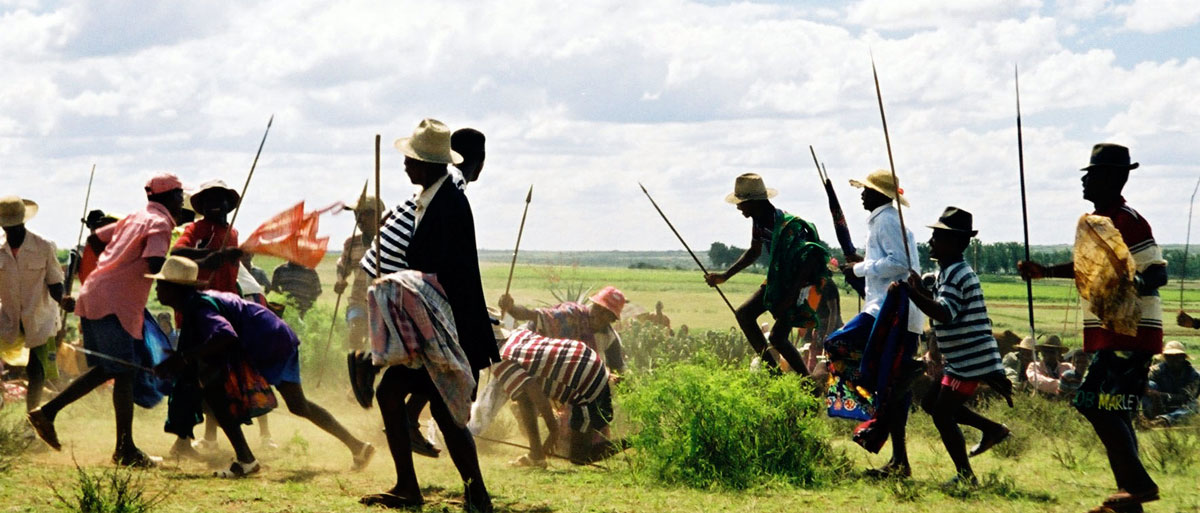
Tandroy men from the Androy region in southern Madagascar perform a funeral dance to honour a deceased. Despite living in an extremely difficult climate, a respect for past generations maintains the resilience of their agropastoral system. Photo: S. Thunander
Agropastoral resilience
A resilient contract with the ancestors
Amid social and environmental change, can an ancient Malagasy agropastoral tradition survive?
- Resilience of the Androy agropastoral system in southern Madagascar depends on a historical and cultural respect for past generations
- On-going climate change, globalization and modernisation challenge the current way of living in the region
- The study also showed that neither the ecosystem nor culture delivered ecosystem services alone, but rather in tandem
Life in Madagascar has been described as "bearing the weight of an ancestral past". For the people of Androy in southern Madagascar, whose majority refer to themselves as Tandroy, that is particularly true.
The Tandroy consist of a number of clans that are connected through a common history of surviving in an arid and drought-prone region. The ancestral connection defines their approach to land use and food production.
From the 16th century to present, a particular low-intensive agropastoral system has been their source of survival despite an extreme environment with irregular rainfall and sometimes year-long cyclical droughts. Add to the fact that they are among the absolute poorest in a country with more than 80 percent living below the international poverty line, a certain admiration is perhaps in order.
A profound respect
Despite continuous struggles, internal conflicts and modern interferences, the resilience of the Androy agropastoral system is, according to centre researchers Jacob von Heland and Carl Folke, at least partly down to what they describe as a "social contract" between living and non-living members of the various clans in the region.
The contract is based on a historical and cultural respect for past generations and provides a strong attractor and a commitment to maintain the agropastoral system.
"We wanted to understand how culture influences the long-term persistence of the agropastoral system in Androy"
Jacob von Heland, lead author
In the study, which which was published in Global Environmental Change, von Heland conducted research reviews, interviews and participatory observations in the area between 2005 and 2010. The study shows how people faced with uncertainty and change relate to, and interpret traditions and methods developed by their ancestors to sustain their agropastoral system and its ecosystem services.
Forests, cattle and rituals
So how is this social contract with their ancestors applied? Tandroy moral order is based on ancestral land and laws recollected through story, song and rituals. Central to the ancestral contract are sacred and protected patches of forests. Within these patches are burial sites for family and clan members.
Because they are protected the sacred forests also serve as a patchwork of crucial refugia for many species. The forests shelter fields from the wind and sand and serve as primary habitats for insects. Bees, a particularly respected insect among the Tandroy, serve as pollinators so that bean crops, an important protein source, can yield a surplus.
But the most important social-ecological connector is the zebu cattle. As one Tandroy describes it: "Just like everything goes through the bank, everything here passes through the zebu. When we make a profit we buy zebu, when we lose wealth and need capital we sell them."
The cattle is also considered as a sacred capital, to be sacrificed to gain access to the sacred burial sites. Indeed, cattle is considered "a passport to eternity" in Androy.
"In cases where a Tandroy has to decide whether to use his cattle to pay for a hospital visit or use them to conduct the sacrifice necessary for gaining access to the ancestral tomb, the role of the cattle as a sacred capital is considered more important," von Heland explains.
Change looms
The fact that the agropastoral system in Androy has survived for so long is the result of social practices that protect organisms in the landscape considered necessary for maintaining the agropastoral system.
But things may be about to change.
Many now living in Androy feel that the climate is becoming too variable and dry. Although they express a pride in "resisting the drought", Tandroy clans are struggling to satisfy their basic subsistence need solely from agropastoralism. Reluctantly, many consider that the current way of living is not a viable option.
"Climate change, globalization and modernisation will most likely challenge life in Androy," von Heland reflects.
"But the lessons of resilience of the Tandroy culture, its capacity to persist with complexity and change should be a source of inspiration for sustainable pathways for the people to live on. To do so, survival strategies will require a sensitivity to the present agropastoral system, its dynamics, history and moral order", von Heland continues.
The study also showed that neither the ecosystem nor culture delivered ecosystem services alone but rather in tandem.
"Work on ecosystem services should explicitly deal with this significant interdependence," co-author Carl Folke adds.
Dancing with cattle during a funeral ceremony. Photo: S. Thunander
citation
von Heland, J., and C. Folke. A Social Contract with the Ancestors – Culture and Ecosystem Services in Southern Madagascar. Global Environmental Change 24:251-264.







